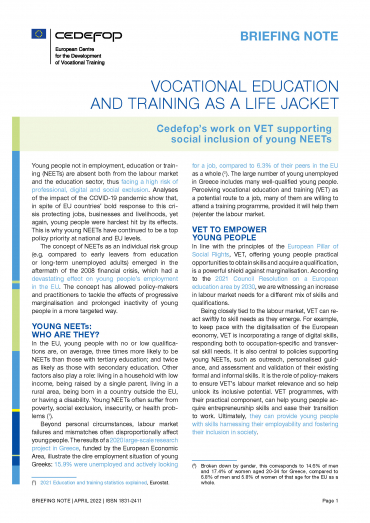Young people not in employment, education or training (NEETs) face a high risk of professional, digital and social exclusion. Analyses of the coronavirus pandemic impact show that young people were hardest hit by its effects. Therefore, young NEETs have been, and still are, a top policy priority at national and EU levels.
In the EU, young people with no or low qualifications are on average three times more likely to be NEETs than those with tertiary education, and twice more likely than those with secondary education. Other factors also play a role, e.g. living in a household with low income, being raised by a single parent, living in a rural area, being born outside the EU or having a disability. NEETs often suffer from poverty, social exclusion, insecurity or health problems.
Vocational education and training (VET) programmes, with their practical component, can help young people acquire entrepreneurship skills and ease their transition to work. They can provide skills to make them more employable and foster their inclusion in society.
Inspired by successful VET practices across Europe, Cedefop has developed an interactive VET toolkit for empowering NEETs. It is designed to help policy-makers, practitioners and learning providers address the specific needs of different groups of NEETs and reintegrate them into education or training and the labour market. The toolkit can be used to:
- design, implement and evaluate interventions to support young NEETs;
- promote mutual learning between policy-makers and practitioners;
- support decision-making through action plans inspired by the toolkit’s resources.
Read more on Cedefop’s toolkit in our latest briefing note.

